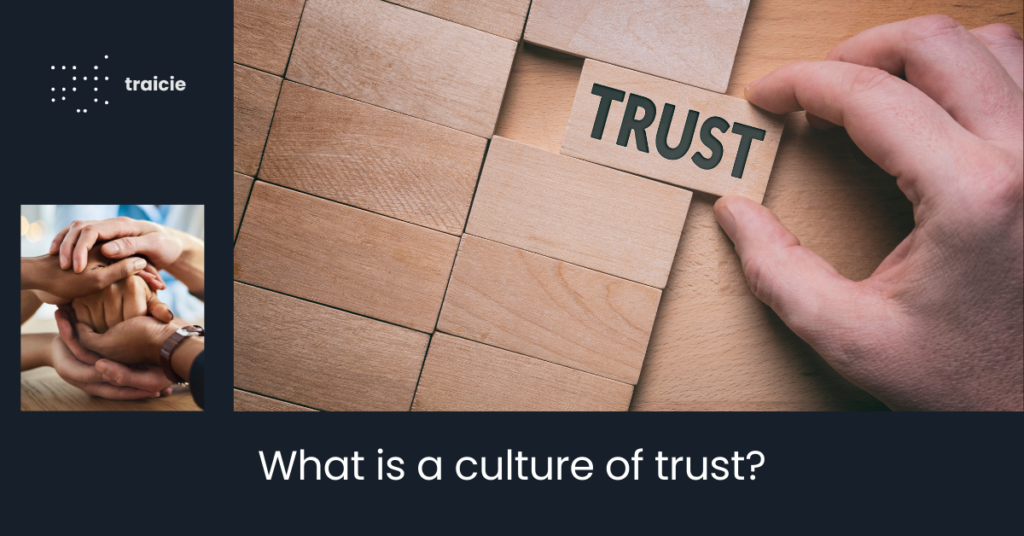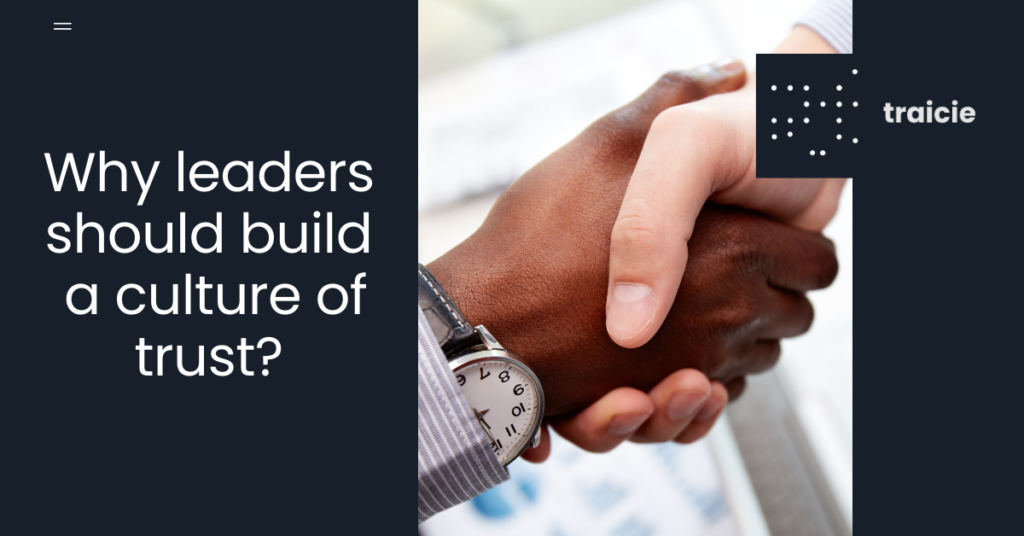Have you ever heard of the culture of trust when starting to work in a new company? Many employees are unsure of what to do during their first time in new companies. They dart around the office, still a bit insecure. They do not know their exact task packet, must get accustomed to the company culture and are unsure who they can ask for advice or information.
It can be challenging when you’re unsure where to turn or what to do! This article will outline some basic steps to help you transition into a culture of trust and make the most of your new position.
What is a culture of trust?

A culture of trust is a system in which individuals trust each other and their relationships. It is a system in which people believe that others are honest and will do what they said they would. A culture of trust can be challenging to create, maintain, and rebuild.
Trust is the key to having healthy relationships with other people. At its core, trust is when one person is willing to open up to what another person does. The principle is that two people should act in a way that helps both. Because of these things, trust is essential for good communication, teamwork, employee commitment, and work output. It makes working relationships stronger and makes the organisation’s culture better.
Note:
People generally agree that a culture of trust in the workplace must be earned because relationships based on trust make employees feel vulnerable. This is true between coworkers, managers, employees and the company. Sometimes it can be hard to build and keep trust because people may not know how they have broken faith with their coworkers without meaning to.
Trust makes it easier to have honest conversations, brings teams closer, and gets employees more interested in their work. When employees and employers know how to build trust, they can make their relationships more robust and their cultures healthier.
Types of trust in the workplace
There are many types of trust in the workplace. The most common type is trust between co-workers. Trust can also be built between customers, businesses, managers and employees. Trust is key to successful relationships, whether personal or professional. It’s essential for building cooperation, communication and trust-based decision-making.
There is more and more research on the culture of trust in the workplace. Additionally, the culture of trust model has been made to help us understand how it is built and kept. Michelle and Dennis Reina made one of these models. Their model of trust shows that capability trust, character trust, and communication trust are the three most essential parts.
- Capability trust is a trust of competence. It grows when there is trust in how knowledgeable, skilled, and able someone is thought to be.
- Character trust is the belief that someone will do what they say and can be counted on.
- Trust in communication is the willingness to share information, tell the truth, admit mistakes, and keep secrets.
Whether you’re building trust for the first time or trying to get it back after it was broken, you need to consider all its parts.
Why should leaders build a culture of trust?

Building trust is the key to unlocking the potential of any organisation. Leaders who create a culture of trust enjoy better employee productivity, customer satisfaction, and overall success. Critical practices can develop trust, including creating an open space, setting high expectations, and providing feedback. Leaders can also foster trust through their actions and words. To establish a culture of trust, leaders must take a holistic approach that considers all aspects of their employees’ lives.
Here are four tips for building a culture of trust:
- Make the environment open. One of the most important things for building trust is open communication. Leaders should make it a top priority to make sure that all employees have the information and tools they need to do their jobs well. This includes communicating clearly and concisely. These factors would make the workplace a good ground to work and generate feedback when needed.
- Include your employees in the decision-making process. Employees are less likely to leave a company if they trust their coworkers, managers, and top leaders. Why? Getting to know someone means letting them in. Therefore, when leaders include employees and teams in the decision-making process and explain why and how specific changes are made, employees can feel more united and confident in the organisation’s direction.
- Innovation. Team members can feel safe coming up with new ideas and trying them out, knowing their leader will back them up. Employees need to know that they can “fail forward” with the support of their manager. They need to know that nobody will get in trouble trying something new.
- Collaboration and Productivity. When employees trust their teams, they may be less likely to wonder if there are any hidden plans. They will also be less likely to talk to other team members about what they think about any “secret techniques”. These side conversations can be distracting, stop work from getting done, and make it hard for people to work together to reach work-related goals.
| >>> Read more: The Employee Life Cycle Model: what is it and why is it essential?
How to build a culture of trust in the workplace?
When starting a new job, it is essential to be aware of the present culture. The culture can either help or hinder the productivity of a team. To transition into a culture of trust, it is essential to understand the different concepts involved. This article will discuss how to build trust or culture with teams.
When getting to know someone new, it’s essential to build trust. Reina’s model gives us a ground to start when we want to build trust: we can show that we are capable, have good character, and are good at what we do. Here are three tips to help you feel more comfortable in new relationships.
- Stick to what you say you’ll do. To build trust, it’s important to say what you’ll do and then do what you said. When promises are kept, people have more faith in the other person’s skills and intentions. We expect what is said to be accurate and others to look out for our best interests.
- Talk to people the right way. To become trustworthy, you need to be able to talk to people well. This means both sharing information openly and keeping things secret when they need to be.
- Be respectful. Respect means being kind to others, listening to their ideas with an open mind, dealing with disagreements healthily, and appreciating them for being who they are. Respecting others shows that you care about them and want them to do well. Setting ground rules for how you want to work together can be helpful so that everyone knows what to expect.
How to rebuild a culture of trust
A mistake or betrayal can hurt relationships, make employees feel less interested in their work, and hurt the company’s culture. Because of these things, it’s essential to think about how to rebuild trust after it’s been broken.
- Be honest about what happened. The first step in rebuilding trust is to admit what happened. Instead of ignoring a betrayal, it can be better for both people to talk about what happened. Make up for what you did or say sorry to show that you’re taking responsibility and want to move on.
- Take small steps. Rebuilding trust doesn’t happen immediately but gradually. You start by keeping your promises, honestly communicating with people, and treating them respectfully. In case faith has been lost, you should look for chances to do compensation, no matter how small it seems. In the long run, these small steps will add up to make a difference.
- Be patient. It can take time to make things right between people. Being patient and letting it grow over time is one of the most important things you can do. The process can’t be rushed if it’s to be done well.
We know that trust makes people closer, relationships more robust, and a company’s culture healthier. People can take risks, adapt to changes, and do their best work when they trust and feel safe. Trust can make people feel better about each other and the organisation.
It can take a long time to earn trust, and it’s easy to lose it. Whether you’re building it for the first time at the beginning of a working relationship or putting it back together after it’s been lost, you can take steps to make it and then keep it going over time.
Conclusion
When we work on building a culture of trust, we must deliberately approach the process. By taking the time to reflect on our past experiences and assess where we are now, we can begin to make changes that will lead us to a path of trustworthiness. By being mindful of our steps and how they impact others, we can create a culture of trust in which everyone feels valued and respected. Trust is essential if you want your relationships to succeed, so start working on building it today!
Do you know that traicie’s sourcing tools for recruiters can help the Hiring Team not just to eliminate Cognitive Biases in Recruitment but also in the strategic, operational value of the recruiting process:
- Cost of a job board – Reduce annual spending on job boards
- Cost of HR tools – Reduce the cost of surveys and assessment tools
- Recruitment costs – Reduce selection costs
- Internal mobility – Fill more skilled jobs with internal staff
- Time to hire – Reduce the number of days a role goes unfilled
- Salary costs – Reduce overall salary costs
- Attrition – Reduce the rate of turnover
- Recruitment cost – Reduce the general recruitment cost